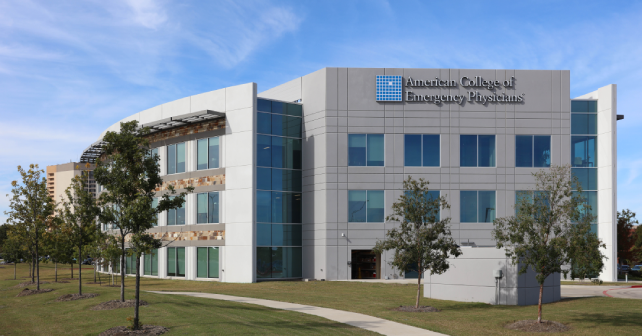
ACEP is strongly opposed to the drastic changes to Medicaid, including stricter eligibility rules, work requirements, and a $1 trillion reduction in spending over the next decade, that are part of the One Big Beautiful Bill Act (OBBBA), which was passed by Congress in late June and signed into law last month.
The College is making sure policymakers hear deep concerns directly from the frontlines.
ACEP included a breakdown of this legislation in the latest episode of the webinar series, “Capitol Rounds.” This most recent webinar features Sar Medoff, MD, an emergency physician in Georgia and a member of ACEP’s State Legislative and Regulatory Committee, presenting the Medicaid work requirement experience in Georgia and Arkansas as a preview of potential challenges that national implementation could bring.
ACEP advocacy staff also discussed OBBBA’s five-year, $50 billion rural health transformation program, the effect on Medicare physician payment, and ACEP-opposed changes to federal student loan programs.
Beyond OBBBA, there are new Centers for Medicare and Medicaid Services (CMS) proposed rules that include numerous updates that ACEP helped develop and strongly supports. If finalized as written, the proposed changes include notable wins for emergency physicians:
- the first Medicare payment increase for emergency physicians in six years,
- permanent codes for emergency medicine and critical care telehealth services, and;
- a new, more sophisticated, quality measure to tackle the boarding crisis.
ACEP is proud to be the voice of emergency physicians amid sweeping federal policy changes. Although the policy landscape remains fluid, it is increasingly clear that now is the time emergency physicians must stay educated, stay engaged, and stand together.
ACEP encourages members to get involved by joining the 911 Network and learning how to contact lawmakers directly through the ACEP Advocacy Center.
In a major step to improve protections for emergency physicians and care teams, a New York ACEP (NYACEP)-supported bill would empower victims of workplace assault to give statements at their job sites. This bill requires hospitals to create or use existing committees to review instances of violence and receive feedback from employees on how these situations can be addressed and staff protected.
“Our health care professionals deserve a workplace free from violence,” said Penelope C. Lema, MD, FACEP, president-elect of NYACEP. “The passage of this bill reaffirms that the safety of those who care for our communities must be a priority. We are grateful to Assembly member Cruz and Senator Sepúlveda for recognizing this critical need and driving meaningful change.”
Supporters of the bill include the Workplace Violence Prevention Alliance, a unified group comprised of NYACEP, the New York State Emergency Nurses Association, and the American Nurses Association – New York.
In a 2024 ACEP poll, 91 percent of emergency physicians said that they, or a colleague, had been victims of violence in the past year. ACEP is making sure that legislators and health care leaders across the country hear directly from emergency physicians: violence should never be considered “just part of the job.”
ACEP and chapters nationwide are proud to lead the push for accountability and stronger protections for emergency physicians and care teams.
New research examining emergency department visits for low back pain found a significant decrease in the use of opioids for treatment, according to a study published last month in Annals of Emergency Medicine.
This signals a shift in clinical practice because of heightened awareness of opioid overuse, the study authors said.
Low back pain was the primary reason for one in 20 emergency visits from 2016-2022, making it one of the most common reasons people seek emergency care.
Researchers analyzed National Hospital Ambulatory Medical Care data to capture trends in how emergency departments across the country diagnose and treat the common condition. They found that the rate of prescribing opioids to treat low back pain decreased considerably, from 32 percent in 2016 to 13 percent in 2022.
“The decline in opioid prescribing shows physicians are responding to evidence and changing their practice at a time of growing awareness of the opioid epidemic,” said Howard S. Kim, MD, MS, FACEP, lead study author and emergency physician at the Northwestern University Feinberg School of Medicine.
The study also identified stable X-ray use ranging from 36-43 percent of low back pain visits over time. This pattern suggests an opportunity to align practice with recent clinical guidelines advising selective use of imaging.
By highlighting trends in current care, the researchers hope their study will lead to continued efforts to improve the efficiency of low back pain care in emergency settings.
“We still have some progress to be made in finding ways to encourage appropriate use of X-rays for low back pain,” said Dr. Kim. “This is a hard problem to tackle, as the decision to order an X-ray is complex and driven by both clinician and patient factors.”
 ACEP Accelerate brings together some of ACEP’s most respected courses and faculty in one dynamic location. Join us in San Diego and experience emergency medicine education at its best. Here’s the lineup:
ACEP Accelerate brings together some of ACEP’s most respected courses and faculty in one dynamic location. Join us in San Diego and experience emergency medicine education at its best. Here’s the lineup:
ACEP Accelerate spans several days, but each individual track only lasts a few days. Find the dates for your conference to help you plan accordingly.
- Observation Medicine Science and Solutions: January 18-19
- Teaching Fellowship Phase 1: January 18-22
- Teaching Fellowship Phase 2: January 19-23
- Pediatric EM Assembly: January 20-22
- Reimbursement: January 20-21
- Coding: January 22
- EDDA Leadership Essentials: January 19-23
- EDDA Team Strategies and Applied Management: January 20-23
- EDDA Small Group Master Class: January 19-22
ACEP Accelerate combines the best features of a large conference with the focused education you value. Multiple conferences at one location offer more options for networking and a more robust exhibit hall. Register today, and we’ll see you in San Diego!
ACEP issued a statement last month to reaffirm the College’s unwavering commitment to the principles and obligations outlined in the Emergency Medical Treatment and Labor ACT (EMTALA). ACEP issued the statement in response to a rescission of the July 2022 Centers for Medicare & Medicaid Services (CMS) guidance on EMTALA.
For nearly 40 years, EMTALA has served as the bedrock guarantee that anyone who seeks emergency care will receive stabilizing treatment, regardless of insurance status, ability to pay, or other circumstances. Regardless of variances in the regulatory landscape from one administration to another, emergency physicians remain committed not just by law, but by their professional oath, to provide this care.
“Emergency physicians are on the frontlines making difficult, time-sensitive decisions to save lives,” said ACEP President Alison J. Haddock, MD, FACEP. “EMTALA ensures that we can provide stabilizing care to any patient who needs it, including pregnant patients experiencing medical emergencies, and it’s more important than ever that we have its backing for our evidence-based medical decisions.”
ACEP urges policymakers and federal officials to continue to uphold and enforce EMTALA in a manner that protects patients and supports the clinical judgment and autonomy of emergency physicians.
“In every emergency department across the country, we will continue to do what we have always done: provide the care necessary to stabilize our patients,” Dr. Haddock said. “That commitment is not optional—it is the law. All emergency physicians must be able to provide the highest quality medical care to pregnant patients without fear of legal consequences.”
ACEP is pushing back on the reduction in indirect cost (overhead research expense) rates for National Institutes of Health (NIH) grants.
ACEP joined 10 medical specialty societies to file an amicus brief on June 16 urging the court to avoid reducing the funding that makes vital medical research possible. The administration’s policy caps indirect costs at 15 percent for all new NIH grants. Previously, the indirect cost rate for each grant had been independently negotiated. In the brief, ACEP and its partner groups emphasized the impact of the policy on physicians and patients.
“A disruption in NIH funding of medical research and clinical trials will profoundly set back the advancement of medical care,” the brief stated. “Not only will a disruption in NIH funding destroy critical ongoing clinical trials and medical studies, it will impair the development of clinical practice protocols and guidelines and therefore will harm patients. Those protocols and guidelines will be based on less reliable and fewer up-to-date studies. Moreover, guidelines and treatment protocols will be updated less frequently, thereby reducing health care professionals’ access to the latest insights into patient care.”
ACEP proudly stands in solidarity with leading members of the medical research community to protect the vital work that sets the foundation for high-quality emergency care in emergency medicine and across the medical specialties.









